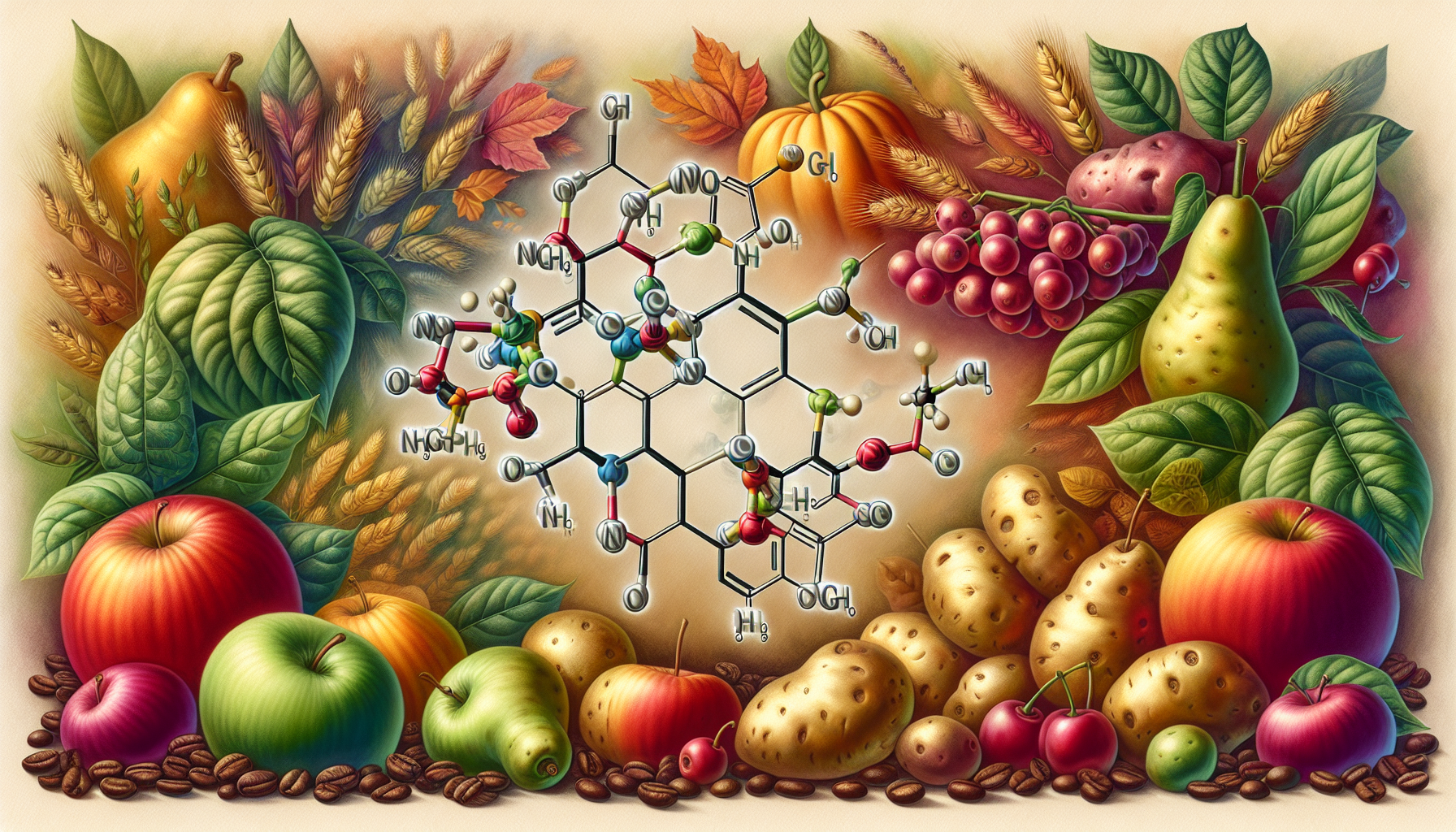Chlorogenic Acid: Benefits, Mechanisms, and Potential Uses
This article delves into chlorogenic acid, a natural compound present in coffee beans as well as numerous fruits and vegetables. Renowned for its antioxidant properties and health advantages, it may play a role in managing diabetes and promoting heart health. We will explore the nature of chlorogenic acid, where it is found, and the benefits it offers to our health.
Key Takeaways
Chlorogenic acid, primarily found in coffee and various fruits and vegetables, offers significant antioxidant, anti-inflammatory, and antidiabetic benefits that support overall health.
Research indicates that chlorogenic acid can aid in weight management, improve insulin sensitivity, and lower blood pressure, making it a valuable addition to dietary supplements.
While chlorogenic acid is generally safe for short-term use, caution is advised regarding potential side effects and the need for personalized dosage recommendations.
Understanding Chlorogenic Acid
Chlorogenic acid is a fascinating polyphenol, formed as an ester of caffeic acid and quinic acid. It represents an intriguing class of naturally occurring organic substances famous for being abundant in a range of plants, with coffee beans as their notable source. These molecules fall under the category of phenolic acids and are widely acclaimed for their potent antioxidant capabilities. Chlorogenic acid is recognized as a polyphenol compound that occurs in many dietary items, drawing considerable attention due to its possible health benefits and positive effects on the immune system.
Originating from the modest, green coffee bean extract, chlorogenic acid’s influence goes much beyond your daily brew. Found in common foods such as potatoes, eggplants, apples, and plums, chlorogenic acid is a regular component of our daily diet. With its ubiquitous occurrence alongside a multifaceted array of potential health benefits, chlorogenic acid has become an important topic within nutritional science and medical research fields.
Chemical Structure and Sources
At the heart of chlorogenic acid’s composition is an ester, formed by combining caffeine with quinic acid. This union results in chlorogenic acids, which have the molecular formula C16H18O9 and a molecular mass of 354.30 grams per mole. This unique chemical structure gives chlorogenic acid its impressive antioxidant and anti-inflammatory properties12. When exposed to heat, chlorogenic acid breaks down into caffeine and quinic acids, both known for their health benefits.
However, chlorogenic acid is sensitive to heat and loses its stability at high temperatures, retaining most of its efficacy when unheated.
You can find chlorogenic acid naturally in various sources, including:
Coffee beans
Potatoes
Eggplants
Apples
Plums
Additionally, higher dicotyledonous plants and certain medicinal herbs, such as honeysuckle and Eucommia ulmoides - also known as the rubber tree native to China, are rich in chlorogenic acid.
Ferulic acid, another potent antioxidant, is often found alongside chlorogenic acid in plant cell walls. It contributes to the plant’s defense mechanisms and offers similar health benefits, including anti-inflammatory and anti-aging properties.
Fatty acid synthase is an enzyme complex involved in the synthesis of long-chain fatty acids. While it operates in a different metabolic pathway, the fatty acids it produces are integral to the structure of plant cell walls where chlorogenic and ferulic acids are present.
Understanding the widespread presence of chlorogenic acid in diverse plant species highlights its importance as a natural polyphenol. This compound not only helps plants defend against threats but also offers numerous health benefits for humans. This dual role makes chlorogenic acid a fascinating subject for further research into its potential as a powerful phytochemical.
Health Benefits of Chlorogenic Acid
Chlorogenic acid is celebrated for its significant health benefits, including antioxidant, antidiabetic, and anti-inflammatory properties. This natural polyphenol is often included in dietary supplements aimed at aiding weight control and enhancing metabolic health.
Incorporating chlorogenic acid into your routine can help defend against various illnesses and promote overall wellness. Beyond supplements, chlorogenic acid is naturally present in many foods and beverages, making it accessible for those seeking to improve their health through natural means. Regular consumption of chlorogenic acid-rich foods such as coffee, fruits, and vegetables can contribute to a balanced diet and support long-term health goals.
Ongoing research continues to reveal new benefits of chlorogenic acid, including its potential role in neuroprotection and cognitive function enhancement. Its ability to combat oxidative stress and inflammation is particularly promising for brain health, potentially reducing the risk of neurodegenerative diseases like Alzheimer's and Parkinson's. As a versatile and powerful compound, chlorogenic acid is a valuable addition to any health regimen, offering a wide range of benefits that extend beyond basic nutrition.
Antioxidant Properties
Chlorogenic acid is celebrated for its significant health benefits, including potent antioxidant, antidiabetic, and anti-inflammatory properties. This natural polyphenol demonstrates higher DPPH scavenging and antioxidant activity even than vitamin E, making it a powerful agent in preventing oxidation and lipid peroxidation. By donating hydrogen atoms to free radicals, chlorogenic acid reduces oxidative stress and inhibits oxidation reactions, thus protecting cells from damage.
Research has shown that chlorogenic acid can significantly reduce the risk of heart diseases by acting as an antioxidant and promoting vasodilation, which enhances blood flow. Its ability to alleviate oxidative stress and inflammation also contributes to its anti-cancer properties, potentially lowering cancer incidence by disrupting tumor growth signaling pathways.
The isomer of chlorogenic acid primarily studied for its antioxidant capacity is 5-CQA, which has been shown to suppress cancer cell proliferation and disrupt the cell cycle, indicating its potential as a therapeutic agent. Additionally, chlorogenic acid offers benefits for skin health, protecting the skin from damage caused by UV radiation and environmental pollutants. Studies have shown that it can improve skin barrier function, reduce dryness, and enhance hydration, as well as promote wound healing by enhancing antioxidant defense mechanisms in the skin.
Incorporating chlorogenic acid into your diet through foods like coffee, fruits, and vegetables, or as a supplement, can provide a wide range of health benefits. The protective effect of chlorogenic acid against oxidative stress induced by damage caused by reactive oxygen species is a testament to its significance in promoting health and preventing disease.
Blood Glucose Support
Chlorogenic acid is a powerful ally in managing type 2 diabetes. Studies have shown that this compound can enhance insulin sensitivity and boost both glucose uptake and metabolism, which is highly beneficial for individuals with impaired glucose tolerance. By increasing insulin secretion and influencing how the body processes glucose, chlorogenic acid helps stabilize blood sugar levels and reduces the risk of developing diabetic complications.
Extracts from green coffee beans, rich in chlorogenic acid, have gained popularity for their potential benefits, including weight loss and improved health markers. These extracts stimulate fat metabolism and decrease glucose absorption into the bloodstream, making them effective supplements for controlling both weight and blood sugar levels. The broader health advantages of green coffee beans continue to attract attention, emphasizing their role in promoting overall metabolic health.
Incorporating chlorogenic acid into your diet through foods like coffee, fruits, and vegetables, or as a supplement, can provide significant benefits for managing diabetes and supporting overall metabolic health.
Anti-inflammatory Benefits
In addition to its antioxidant and antidiabetic properties, chlorogenic acid exhibits significant anti-inflammatory benefits. This compound helps reduce inflammatory stress in the body, supporting overall health and well-being. Chlorogenic acid mitigates inflammatory responses, playing a crucial role in preventing and managing chronic diseases.
Chlorogenic acid’s anti-inflammatory effects are particularly beneficial for liver health. This compound helps mitigate liver injuries and reduce inflammation in liver tissues through its antioxidant and anti-inflammatory properties. The protective effects of chlorogenic acid extend to cardiovascular health as well, where it diminishes inflammation and oxidative stress, thereby reducing the risk of cardiovascular diseases.
Overall, the ability of chlorogenic acid to reduce oxidative stress and inflammation underscores its importance in maintaining health and preventing disease. Its multifunctional benefits make it a valuable addition to any health-focused regimen.
Chlorogenic Acid and Liver Health
Chlorogenic acid has shown great promise in enhancing liver health, particularly in the context of metabolic dysfunction-associated steatotic liver disease (MASLD). This compound boosts the liver’s detoxification processes and plays a crucial role in protecting against liver-related conditions by reducing inflammation and oxidative stress in hepatic tissues.
Chlorogenic acid supports liver wellness through its diverse effects, emphasizing its importance in maintaining the proper function of this vital organ. It is associated with defensive actions against multiple liver disorders, positioning it as a potential treatment candidate. Studies indicate that chlorogenic acid may help alleviate the severity of liver fibrosis, a serious consequence of persistent liver illnesses. By lowering the likelihood and intensity of hepatitis, chlorogenic acid treatment fosters improved hepatic well-being.
Upon intake, chlorogenic acid undergoes metabolic transformation within hepatocytes, producing various phenolic derivatives that enhance its beneficial impact on health. These metabolites amplify detoxifying activities in hepatic tissues, bolstering overall liver function and acting as safeguards against various diseases afflicting the organ.
Research indicates that chlorogenic acid is effective in decreasing indicators of inflammation. It has been noted to substantially diminish liver inflammation markers, including TNF-α and IL-6, which play central roles in promoting liver inflammation. By adjusting cytokine levels and influencing essential pathways such as Nrf2 and TLR4/NF-κB, chlorogenic acid mitigates liver inflammation. This reduction in inflammatory responses aids the immune system in preventing the development of liver fibrosis, thus promoting the overall health of the liver and immune system.
Role in Cardiovascular Health
Chlorogenic acid plays a crucial role in cardiovascular health, offering significant protective effects against cardiovascular diseases and type 2 diabetes. Its anti-inflammatory and antioxidant properties contribute to its benefits, potentially lowering the risk of heart disease. However, long-term use should be approached cautiously, especially for individuals with specific health conditions like high blood pressure or anxiety disorders.
While chlorogenic acid presents numerous cardiovascular benefits, high doses might elevate levels of homocysteine, a factor associated with heart disease. Therefore, careful consideration is necessary when using chlorogenic acid to balance its benefits and potential risks.
Blood Pressure Regulation
Studies have demonstrated that chlorogenic acid can significantly reduce both the systolic blood pressure and diastolic blood pressure, thereby promoting heart health. This substance is associated with meaningful reductions in blood pressure readings, emphasizing its viability as a natural option for managing high blood pressure.
Chlorogenic acid’s ability to enhance insulin sensitivity and control glucose levels underscores its contribution to cardiovascular wellness. By reducing insulin resistance and decreasing blood glucose concentrations following meal consumption, it aids in the regulation of blood pressure and diminishes the threat of cardiovascular complications.
Improving Endothelial Function
Chlorogenic acid plays a pivotal role in bolstering the function of human endothelial cells, which are essential for preserving the health of blood vessels and warding off cardiovascular diseases. It is significant in sustaining vascular equilibrium and ensuring the wellbeing of blood vessels, particularly in mitigating postprandial endothelial dysfunction.
Through its ability to augment tight junction integrity and stimulate angiogenesis—the development of new blood vessels—chlorogenic acid significantly uplifts endothelial health. These enhancements lead to improved overall vascular performance and diminish the likelihood of experiencing various cardiovascular disease conditions.
postprandial endothelial dysfunction
Chlorogenic Acid and Skin Health
Chlorogenic acid offers numerous benefits for skin health, making it a valuable addition to skincare routines. This natural polyphenol, found in coffee and various fruits and vegetables, is celebrated for its potent antioxidant and anti-inflammatory properties, which are crucial for maintaining healthy skin.
Antioxidant Protection
Chlorogenic acid helps protect the skin from oxidative stress caused by environmental factors such as UV radiation and pollution. By scavenging free radicals, it prevents cellular damage and reduces the signs of aging, such as wrinkles and fine lines. Studies have shown that chlorogenic acid can significantly improve skin barrier function, enhancing the skin's ability to retain moisture and protect against external irritants.
Anti-Inflammatory Effects
Inflammation is a common underlying factor in many skin conditions, including acne, eczema, and psoriasis. Chlorogenic acid's anti-inflammatory properties help reduce inflammation and soothe irritated skin. It has been found to decrease the production of pro-inflammatory cytokines like TNF-α and IL-6, which play a central role in promoting skin inflammation. By modulating these inflammatory pathways, chlorogenic acid helps maintain a calm and balanced complexion.
Enhancing Skin Hydration
Chlorogenic acid also contributes to improved skin hydration. It enhances the skin's natural barrier function, reducing transepidermal water loss and keeping the skin hydrated and supple. This is particularly beneficial for individuals with dry or sensitive skin, as it helps maintain optimal moisture levels and prevents dryness and flakiness.
Promoting Wound Healing
Research indicates that chlorogenic acid can promote wound healing by enhancing antioxidant defense mechanisms in the skin. It stimulates the production of collagen and other extracellular matrix components, which are essential for tissue repair and regeneration. This makes chlorogenic acid a promising ingredient for treating minor cuts, burns, and other skin injuries.
Incorporating chlorogenic acid into your skincare routine, whether through diet or topical applications, can provide a wide range of benefits for skin health. Its powerful antioxidant and anti-inflammatory properties make it an excellent choice for maintaining a healthy, youthful complexion.
Bioavailability and Metabolism of Chlorogenic Acid
The absorption and metabolic transformation of chlorogenic acid play significant roles in determining its effectiveness and associated health advantages. About 33% of chlorogenic acids ingested via coffee intake are taken up by the human digestive tract, utilizing a variety of pathways for absorption.
Grasping these mechanisms is key to maximizing the potential health benefits that come with consumption of chlorogenic acid.
Absorption Mechanisms
Chlorogenic acid enters the body through multiple pathways, which encompass both swift assimilation in the stomach and a slower uptake process within the small intestine. This absorption is subject to variation based on concentration levels and is also affected by how tightly intestinal junctions are sealed.
Key players in signaling pathway facilitating chlorogenic acid’s entry into systemic circulation include transport mechanisms such as monocarboxylate transporters.
Metabolic Pathways
Once it enters the body, chlorogenic acid is subjected to a range of metabolic processes in several organs including the stomach, intestine, liver and kidneys. These processes result in the creation of active metabolites which have distinct, biological properties and impacts throughout the organism.
Grasping molecular mechanisms of these metabolic routes is essential for enhancing the therapeutic advantages linked with chlorogenic acid consumption.
Potential Side Effects and Safety
It is essential to recognize that, despite the multiple health benefits of chlorogenic acid, there are safety concerns and potential side effects to consider. Elevated blood pressure and an accelerated heart rate can result from consuming high doses.
Those who have a sensitivity to caffeine might find themselves dealing with anxiety, agitation, and headaches if they ingest significant quantities of green coffee.
Common Side Effects
Individuals taking chlorogenic acid might encounter manageable and mild side effects, including headaches, anxiety, or discomfort in the upper gastrointestinal tract or region. Monitoring any negative responses is crucial when initiating a new supplement regimen to ensure safety and well-being.
Safety in Long-Term Use
Studies suggest that chlorogenic acid can be ingested without notable health hazards for durations of up to 12 weeks. While daily intake within typical dietary boundaries over the long term seems to be safe, prudence is recommended as there’s a scarcity of studies on extended usage.
Applications in Dietary Supplements
The use of chlorogenic acid in dietary supplements is prevalent because of its beneficial health properties, which are especially present in extracts from green coffee beans. It’s accepted that these green coffee bean extracts are safe when used over the short term, with recommended dosages reaching up to 1000 mg per day for a period of up to 12 weeks.
Within standard dietary consumption levels, the lack of notable adverse effects reinforces the suitability of incorporating it into supplement regimes.
Green Coffee Bean Extracts
Extracts from green coffee beans have become a sought-after health supplement, largely because they are rich in chlorogenic acid. This rise in popularity within the wellness sector is driven by consumers who are on the lookout for natural products that offer health advantages. It’s thought that chlorogenic acid, a key element of these extracts, plays an essential role by offering antioxidant benefits which help shield cells against damage.
Studies suggest that green coffee bean extract extract and chlorogenic acid may play a supportive role in managing weight through its impact on glucose metabolism and the body’s fat storage mechanisms. The value of green coffee bean extracts goes beyond their use as supplements. They’re increasingly incorporated into dietary and functional food items to enhance nutritionally-minded eating habits.
Formulations and Dosages
Users should adhere to the dosage instructions on product labels and seek personalized advice from healthcare providers for chlorogenic acid supplements, as there isn’t a universally recognized ideal dosage. Due to substantial variations in quality and concentration of chlorogenic acid across various products, tailored dosing guidance is crucial.
Summary
In summary, chlorogenic acid is a powerful natural compound with a wide range of health benefits. From its antioxidant and anti-inflammatory properties to its role in managing diabetes and supporting liver and cardiovascular health, chlorogenic acid proves to be a valuable addition to any health regimen. Its potential in cancer prevention and therapeutic applications further underscores its significance.
Understanding the bioavailability, metabolism, and potential side effects of chlorogenic acid is crucial for optimizing its health benefits. While it is generally safe for consumption, it is important to be mindful of dosage and individual sensitivities.
Incorporating chlorogenic acid into your diet through natural sources or supplements can enhance your overall well-being. As research continues to uncover its potential, chlorogenic acid stands out as a remarkable compound in the pursuit of health and wellness.
Frequently Asked Questions
What are the main health benefits of chlorogenic acid?
Chlorogenic acid delivers both antioxidant and anti-inflammatory advantages, bolstering liver function and heart health while potentially contributing to the prevention of cancer and managing diabetes.
This compound’s wide-ranging health benefits render it an important contributor to overall wellness.
How is chlorogenic acid absorbed in the body?
The absorption of chlorogenic acid predominantly takes place in the stomach and small intestine. This process is influenced by two primary factors: the concentration levels of the compound and the state of health regarding intestinal junctions.
It’s important to recognize that digestive well-being along with the concentration amount plays a crucial role in how effectively chlorogenic acid is absorbed.
Are there any side effects of consuming chlorogenic acid?
Yes, consuming chlorogenic acid may lead to mild side effects such as headaches, anxiety, or gastrointestinal discomfort, and high doses can cause increased heart rate and elevated blood pressure in caffeine-sensitive individuals.
Can chlorogenic acid help with weight management?
Indeed, chlorogenic acid has the capacity to aid in weight management by impacting fat storage and glucose metabolism. By doing so, it promotes increased fat burning while diminishing the absorption of glucose.
Incorporating this compound can be a valuable element within strategies for managing weight effectively.
Is it safe to take chlorogenic acid supplements long-term?
Taking chlorogenic acid supplements is considered safe when used for a period of up to 12 weeks. Because there’s a lack of research regarding their effects over an extended duration, it’s recommended to be cautious with long-term use.
Before starting on a course of supplementation that goes beyond this time frame, it is wise to seek advice from a healthcare provider.
Disclaimer
The information provided in this article is for educational and informational purposes only and is not intended as medical advice. While we work diligently to provide accurate and up-to-date information, we make no representations or warranties of any kind, express or implied, about the completeness, accuracy, reliability, suitability, or availability with respect to the content. The information contained herein should not be used as a substitute for the advice of an appropriately qualified and licensed physician or other healthcare provider. The suggestions and insights should not be used for diagnosing or treating a health problem or disease, or prescribing any medication. Always seek the advice of your physician or other qualified health provider with any questions you may have regarding a medical condition or treatment and before undertaking a new health care regimen. Never disregard professional medical advice or delay in seeking it because of something you have read on this site.
References
Bagdas D, Gul NY, Topal A, Tas S, Ozyigit MO, Cinkilic N, Gul Z, Etoz BC, Ziyanok S, Inan S, Turacozen O, Gurun MS. Pharmacologic overview of systemic chlorogenic acid therapy on experimental wound healing. Naunyn Schmiedebergs Arch Pharmacol. 2014 Nov;387(11):1101-16. doi: 10.1007/s00210-014-1034-9. Epub 2014 Aug 17. PMID: 25129377.
Huang J, Xie M, He L, Song X, Cao T. Chlorogenic acid: a review on its mechanisms of anti-inflammation, disease treatment, and related delivery systems. Front Pharmacol. 2023 Sep 13;14:1218015. doi: 10.3389/fphar.2023.1218015. PMID: 37781708; PMCID: PMC10534970.
Jiang Y, Wu L, Zhu X, Bian H, Gao X, Xia M. Advances in management of metabolic dysfunction-associated steatotic liver disease: from mechanisms to therapeutics. Lipids Health Dis. 2024 Apr 2;23(1):95. doi: 10.1186/s12944-024-02092-2. PMID: 38566209; PMCID: PMC10985930.
Kim J, Jeong IH, Kim CS, Lee YM, Kim JM, Kim JS. Chlorogenic acid inhibits the formation of advanced glycation end products and associated protein cross-linking. Arch Pharm Res. 2011 Mar;34(3):495-500. doi: 10.1007/s12272-011-0319-5. Epub 2011 May 6. PMID: 21547683.
Li L, Su C, Chen X, Wang Q, Jiao W, Luo H, Tang J, Wang W, Li S, Guo S. Chlorogenic Acids in Cardiovascular Disease: A Review of Dietary Consumption, Pharmacology, and Pharmacokinetics. J Agric Food Chem. 2020 Jun 17;68(24):6464-6484. doi: 10.1021/acs.jafc.0c01554. Epub 2020 Jun 8. PMID: 32441927.
Nguyen V, Taine EG, Meng D, Cui T, Tan W. Chlorogenic Acid: A Systematic Review on the Biological Functions, Mechanistic Actions, and Therapeutic Potentials. Nutrients. 2024 Mar 23;16(7):924. doi: 10.3390/nu16070924. PMID: 38612964; PMCID: PMC11013850.
Stefanello N, Schmatz R, Pereira LB, Rubin MA, da Rocha JB, Facco G, Pereira ME, Mazzanti CM, Passamonti S, Rodrigues MV, Carvalho FB, da Rosa MM, Gutierres JM, Cardoso AM, Morsch VM, Schetinger MR. Effects of chlorogenic acid, caffeine, and coffee on behavioral and biochemical parameters of diabetic rats. Mol Cell Biochem. 2014 Mar;388(1-2):277-86. doi: 10.1007/s11010-013-1919-9. Epub 2013 Dec 27. PMID: 24370728.
Tajik N, Tajik M, Mack I, Enck P. The potential effects of chlorogenic acid, the main phenolic components in coffee, on health: a comprehensive review of the literature. Eur J Nutr. 2017 Oct;56(7):2215-2244. doi: 10.1007/s00394-017-1379-1. Epub 2017 Apr 8. PMID: 28391515.
van Dijk AE, Olthof MR, Meeuse JC, Seebus E, Heine RJ, van Dam RM. Acute effects of decaffeinated coffee and the major coffee components chlorogenic acid and trigonelline on glucose tolerance. Diabetes Care. 2009 Jun;32(6):1023-5. doi: 10.2337/dc09-0207. Epub 2009 Mar 26. PMID: 19324944; PMCID: PMC2681030.
Xue N, Liu Y, Jin J, Ji M, Chen X. Chlorogenic Acid Prevents UVA-Induced Skin Photoaging through Regulating Collagen Metabolism and Apoptosis in Human Dermal Fibroblasts. Int J Mol Sci. 2022 Jun 22;23(13):6941. doi: 10.3390/ijms23136941. PMID: 35805942; PMCID: PMC9266774.
Ziółkiewicz A, Niziński P, Soja J, Oniszczuk T, Combrzyński M, Kondracka A, Oniszczuk A. Potential of Chlorogenic Acid in the Management of Metabolic Dysfunction-Associated Steatotic Liver Disease (MASLD): Animal Studies and Clinical Trials-A Narrative Review. Metabolites. 2024 Jun 20;14(6):346. doi: 10.3390/metabo14060346. PMID: 38921480; PMCID: PMC11205996.















